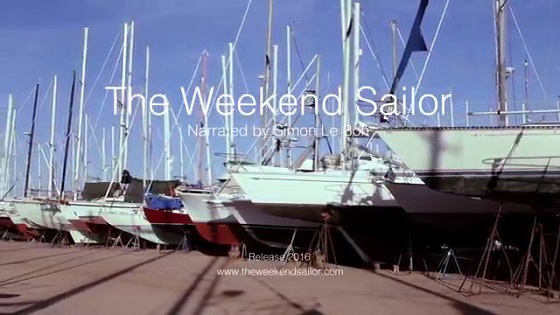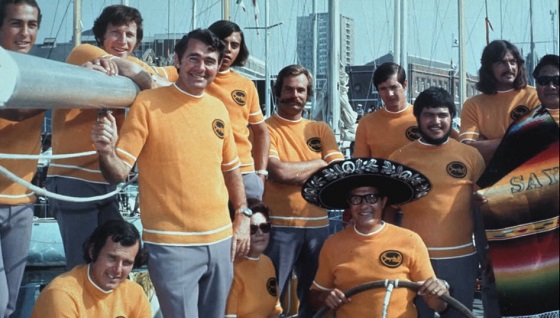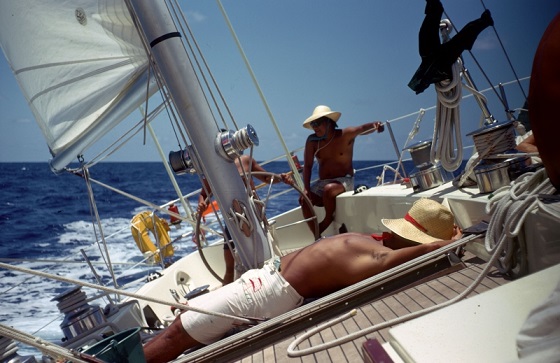[Solid Rock Fist Up]
“In 1973, Mexican businessman Ramon Carlin gathered a crew of young sailors for the first head-to-head sailing race around the world. He had no captain’s license, no boat and almost no experience. This 9-month expedition would be one of the most dangerous and demanding sailing races in history.”
So says the opening text of The Weekend Sailor, a documentary feature about competitive sailing by rookie director Bernardo Arsuaga. The sporting world loves a good underdog story, especially if it happens to be a true one, and much of what works about The Weekend Sailor is the result of this tried and true reality. A bit lean at times, and lacking in outside context as it concerns the larger implications of the story he wishes to tell, Arsuaga nevertheless does a fine job taking his audience for a ride. And while the documentary itself doesn’t really challenge or push its audience, the remarkable nature of the tale mostly fills in the gaps left by this shortcoming.
The architect of the events in The Weekend Sailor is Ramon Carlin, a wealthy Mexican businessman who in the early 70s learned of the first organized round the world yacht race, and promptly decided that he wanted to win the thing. Part of Ramon’s motivation was to stall the impending marriage of his son, so he recruited the kid, along with his own wife, a nephew, and pretty much anyone else who showed an interest in going. And while France, England, Poland, Italy, and others crewed teams of world-class sailors, handpicked out of hundreds of willing candidates, Ramon’s group came together like something straight out of 1989’s Major League.
“We didn’t have the best crew in the race,” one of Ramon’s sailors candidly tells the camera at one point; yet they did have Ramon, who got his team one hell of a boat (the Sayula II), and the best possible gear for their 1973/’74 adventure. The Weekend Sailor unspools from here, introducing the rag-tag team of the Sayula before outlining the race to follow, which was parsed out in four brutal legs. Starting at Portsmouth, England, the 19 boats in competition had to make it to Cape Town, South Africa, then to Sydney, Australia, and from there to Rio de Janiero, Brazil, and finally back again to Portsmouth. Although the crews were given time to re-stock and refit at each point, 27,000 nautical miles (50,000 km) and roughly seven months separated the start from the finish.
Early on, Arsuaga does a fine job putting all the necessary pieces together to make The Weekend Sailor not just compelling, but decidedly human as well. A mix of talking head interviews cut together with photos and archive video footage shot before and during the race puts the audience right in the middle of the drama. What’s more, nearly all of the Sayula’s crew have been reenlisted to reflect on the race now forty-plus years in the past: the commonality amongst them the wide smiles they wear when speaking about the ordeal. Arsuaga juxtaposes this against an unpacking of the competition Ramon and his crew faced, who are painted as the elite of the professional sailing world.
Yet the audience never gets to hear from these competitors directly, or from any organizers of the race, save the current one, who seems to be in The Weekend Sailor simply to drum up interest in the rebranded competition now called the “Volvo Ocean Race.” Although practical considerations like the production budget and access to these rival competitors likely played a role in their exclusion, it does leave the documentary wanting a bit in terms of context and perspective for the story. Although Arsuaga does a fine job giving examples of how underestimated (and scorned) Ramon and his crew were at the outset, a brief investigation into why they maybe shouldn’t have competed (lack of experience, safety concerns, etc.) would have ultimately made it all the more impressive that they went ahead anyway.
Part of this angle comes through in the telling of the story, which saw Ramon and his Sayula crew suffer numerous setbacks. Ramon’s wife went AWOL at the end of the first leg, and their boat nearly capsized and killed everyone onboard halfway through the second. Yet like any great sports story, the motley band of strangers that comprised the Sayula’s crew found a way to come together as a team, and bonded over their shared struggles and the fact that nobody had given them a chance. At the center of it all was Ramon, who let his sailors drink, horse around, and generally enjoy the entire experience as one great big adventure. Like the coach of any good underdog sports story, it was Ramon who infused the crew with a winning attitude, and fostered the family dynamic that ultimately helped to make them successful.
Currently playing at this year’s Seattle International Film Festival, The Weekend Sailor isn’t a hard-hitting investigation or a thought-provoking exploration of anything beyond what can happen when you believe in yourself and your dreams. Although this might leave some people wanting, for those looking for an entertaining, feel-good story with a cast of colorful characters and a happy ending, Arsuaga’s documentary fits the bill.








Comments on this entry are closed.